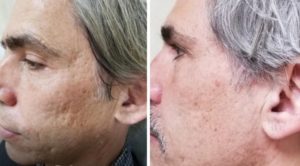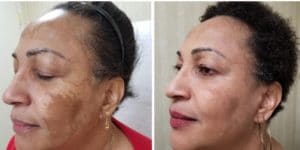Microneedling vs chemical peel? For those concerned with the health and appearance of their skin, microneedling and chemical peels offer two different approaches to address concerns like scars, wrinkles, age spots, acne scars, sun damage and more. Discover which procedure is right for you by learning about each method’s advantages and disadvantages.

What is microneedling?
Microneedling is a minimally invasive procedure that involves using fine needles to create controlled micro-injuries in the skin. These wounds stimulate collagen and elastin production and improve skin texture, tone, and appearance. It is suitable for all skin types and addresses a number of concerns including wrinkles, acne scars, stretch marks, hyperpigmentation, and more. Sometimes microneedling is combined with with other treatments, such as the infusion of skin care products and even with PRP. RF microneedling or microneedling rf is when this treatment also delivers radiofrequency to increase the benefits of both technologies.
Benefits of microneedling?
One of the biggest benefits of microneedling is its ability to help improve skin tone and texture. By creating micro-injuries, this procedure encourages the body’s natural healing response which improves cell regeneration, in turn improving skin texture, tone and overall appearance. Additionally, microneedling can be used on all skin types and colors with minimal risk of side effects or discomfort. There is little to no downtime with microneedling treatments.
Related: Cosmetic dermatology
What is a chemical peel?
A chemical peel is a skin-resurfacing procedure that utilizes chemicals, usually an acid, to remove the outermost layer of skin. Chemical peels are used to improve the texture and tone of your skin as well as reduce acne, dark spots, age spots, wrinkles and other skin imperfections. This treatment may be performed with various acids such as glycolic acid, lactic acid, salicylic acid, tricholacetic acid and more. Chemical peels come in different strengths divided by how deep they penetrate the skin. However, it is important to note that chemical peels can cause more extreme side effects in some cases and may not be suitable for those with certain skin types or conditions. Particularly for people with darker skin tones, it is important that they work with a qualified professional with experience doing chemical peels on their skin type.

Benefits of a chemical peel
Chemical peels offer a variety of benefits, including: improved skin texture, tone and complexion; decreased wrinkles, age spots and freckles; increased collagen production for an overall plumping effect; diminished acne scars and blemishes; and improvement of certain skin conditions such as acne, post inflammatory hyperpigmentation, sun damage, melasma or lesions. Chemical peels are so popular because they can deliver results at a great value.
Which treatment is right for you?
It’s important to consider the pros and cons of each skin rejuvenation treatment before making a decision. Microneedling is best for afternoon sun damage and dark spots, while chemical peels are good for acne, reducing wrinkles, age spots, a glowing complexion, acne scars and blemishes. The combination of rf microneedling, such as with the Cutera Secret rf, is great for skin tightening and acne scars. Ultimately, it depends on the individual’s condition, desired results as well as their skin type.
Microneedling vs chemical peel
Schedule a consultation with us to learn more about these treatments and find out which one is right for you.
READ: chemical peels for men


